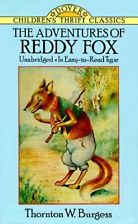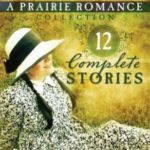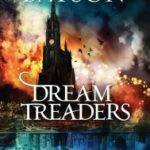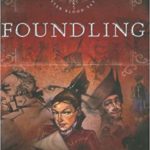Speculative Fiction And Children’s Books
 All the children’s books I remember from my childhood were speculative stories. I wonder if there are any other kind. Animals talk, or trains. Stuffed animals come to life. Elephants fly. Or have no trunk.
All the children’s books I remember from my childhood were speculative stories. I wonder if there are any other kind. Animals talk, or trains. Stuffed animals come to life. Elephants fly. Or have no trunk.
I’ll admit, I don’t remember my first “chapter books.” Back in those dark ages, children’s literature wasn’t so carefully labeled. But I don’t think I was a great reader in those early years either.
Several books which my brother owned, as I recall, were The Adventures of Reddy Fox and perhaps one or two other “Adventures” by Thornton Burgess—definitely speculative stories since they were told from the perspective of various animals. 
Another series my dad read to us (and my brother owned) was the Sugar Creek Gang books. We also had some Danny Orlis books by Bernard Palmer, put out by Moody Press, if I remember correctly.
As a teen, I discovered mystery. I loved Nancy Drew but also received copies of a Christian take-off of the Hardy Boys books.
Now these books which I read in my middle grade years and on into my early teens were no longer fantasy. They were largely contemporary, until I discovered Pride and Prejudice and Little Women. Suddenly history opened to me. And adult books, with adult protagonists.
All this reminiscing for a couple reasons. First I don’t think much has changed regarding those first books children receive—they are often infused with elements of fantasy.
Since the Harry Potter books came out, middle grade and young adult books have eagerly followed in its fantasy footsteps, though the type of fantasy has certainly swung—from a brief foray into fairy stories to vampire tales, urban fantasy, and dystopian. A year or so ago, there was a movement toward epic fantasy, but that seems to have been short lived.
But what about Christian books?
 Sadly, there seems to be little for young children, and the titles that are in publishers’ catalogs seem to be missing the fantasy of the books I grew up loving or of the classic children’s stories such as Winnie the Pooh by A. A. Milne or Dr. Seuss’s The Cat in the Hat.
Sadly, there seems to be little for young children, and the titles that are in publishers’ catalogs seem to be missing the fantasy of the books I grew up loving or of the classic children’s stories such as Winnie the Pooh by A. A. Milne or Dr. Seuss’s The Cat in the Hat.
In addition, I don’t see any chapter books—let alone any fantasy stories that will spark the imagination.
Gratefully the publishers are doing a little better with middle grade and young adult fiction, though the number of titles is still small. However, there are some excellent offerings, many in the fantasy genre.
I have to admit, though, that I am troubled by the small amount of fiction offered by Christians for children, as I said recently at A Christian Worldview of Fiction. Because God has given adults the responsibility of passing on the truth about God, and because He said we are to use every opportunity to do so, I think stories offer the perfect opportunity for showing what we believe. I think speculative stories tap into the imagination of children, so the two are a perfect fit.
The problem, as I see it is this: Christian publishers don’t produce much children’s fiction—few board books, few if any chapter books, though some middle grade and young adult books.
Secondly, board books, which rely heavily on the pictures, don’t fit well into the new realities of publishing. The pictures don’t translate particularly well to e-readers and they are expensive to produce in print, making it difficult for self-published writers and illustrators to make any money from their books. Either they price their book low so readers can afford it—in which case, they make virtually no money—or they price the book so that they can make a profit but then sell few copies because of the expensive cover price.
Consequently, it seems traditional publishers need to step up and increase the number of titles they’re producing for children. They say, however, that children’s books don’t sell.
I find that hard to believe in light of the popularity of the Veggie Tales stories. I mean, a talking tomato or cucumber held kids captive. The popularity isn’t because of the graphics, I don’t think. The art work is pretty basic. Rather, I think the writing was imaginative and fun.
So those qualities seems to be the secret to selling children’s books.
Not to mention that women—moms and grandmas and aunts—are, by all reports, the largest number of customers in Christian book stores. How hard should it be to sell a mom a book for her kids?
I have to wonder if we, the consumers, might need to take the matter into our own hands and start pressing our bookstores and Christian publishers for more children’s books.
There are untold number of writers longing to put good books in the hands of children. And there are hundreds of thousands of children in need of good books. I can’t imagine there isn’t a way to bring the two together.
So, what books did you have as a small child? Did they have fantasy elements? What kinds of books would you like to see publishers produce in a larger quantity? What do you think readers can do to convince publishers there is a market for Christian children’s books? Or do you disagree that the market exists?











































When I was little, I read Dr. Seuss, Curious George, Amelia Bedelia, the Bernstein Bears, and random books found at the public library. Pretty standard fare, I think.
Curiously, I think the Bernstein Bears have taken a more Christian turn in some of their (relatively) recent books. Also, have you seen the Tales of Friendship Bog (a series of chapter books), by Gloria Repp? I was given a couple to review last year and they’re quite good.
Hmm, Christian kids fic that I read.
I also read the Sugar Creek Gang. I even read some Mandie, since my sister had it. I remember reading John Bibee’s The Magic Bicycle, Dylwyn Horvath’s Operation Titan, and Jeanne Norweb’s The Forgotten Door. Oh, and Muriel Leeson’s Path of the Promise Keeper.
I don’t really get why Christian kid’s fic wouldn’t sell. I think it’s really the CBA wanting to sell nothing that takes even the slightest amount of work to merchandise or promote. If anything, parents today seem more separatist than when they were when I was a kid; my mom bought me Christian kids books and she never even thought of homeschooling me.